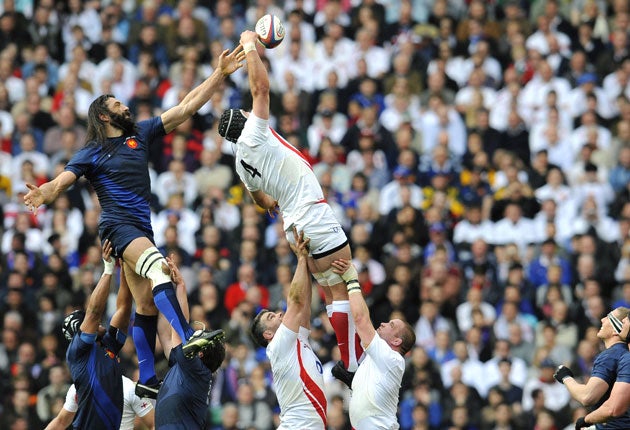Union chiefs rewrite the rule book
Unpopular law variations rejected to restore the game's traditional virtues

Your support helps us to tell the story
From reproductive rights to climate change to Big Tech, The Independent is on the ground when the story is developing. Whether it's investigating the financials of Elon Musk's pro-Trump PAC or producing our latest documentary, 'The A Word', which shines a light on the American women fighting for reproductive rights, we know how important it is to parse out the facts from the messaging.
At such a critical moment in US history, we need reporters on the ground. Your donation allows us to keep sending journalists to speak to both sides of the story.
The Independent is trusted by Americans across the entire political spectrum. And unlike many other quality news outlets, we choose not to lock Americans out of our reporting and analysis with paywalls. We believe quality journalism should be available to everyone, paid for by those who can afford it.
Your support makes all the difference.Rugby union has looked a lot like rugby league this season. Next term, it will look much more like itself. Around 60 of the game's most senior and respected figures, including an impressive roll-call of world-class coaches from both sides of the Equator, decided yesterday to reject the most contentious of the Experimental Law Variations introduced over the last 16 months. As a result, some of the great distinguishing features of the union code have been saved.
First among these is the maul – one of the sport's unique dynamics. Under the ELVs that have disfigured the game in Europe since their introduction at the start of this current campaign, players were given carte blanche to drag down an opposition maul, thereby rendering it almost entirely redundant. Taken together with a more ruthless approach to the refereeing of the tackle area, it left many teams wondering whether possession of the ball was worth the trouble and led to a sharp increase in safety-first kicking. Happily, delegates at the two-day conference in London voted for a return to the status quo ante.
The ELVs also had a major impact on another of union's specialities, the line-out, and, in the view of many, threatened the very existence of the scrum in the long term. Following a detailed examination of analysis taken from some 800 matches around the world, the sport's "stakeholders" – chairmen and chief executives of governing bodies, tournament administrators, referees and players' union officials, as well as coaches – agreed that the flawed idea of a numerical free-for-all at the line-out should be ditched.
Rejection of the ELVs did not end there. The southern hemisphere "sanctions" experiment, under which technical offences at the ruck have been punished by free-kicks rather than full penalties, also bit the dust, to the audible relief of the European contingent, who were spared the pain and anguish of trialling a measure that might easily have destroyed the sport's claim to being open to all shapes and sizes. Further work on the tackle area will take place over the coming seasons, but to all intents and purposes, the free-kick frenzy is dead. Only a small handful of the less dramatic ELVs passed muster at the conference, and these will be recommended for elevation to full law by the International Rugby Board council next month. These include permitting quick throw-ins from touch and enforcing a five-metre offside line at the scrum.
Insiders described the conference as "less fractious than anticipated", although two groups in particular were less than ecstatic at the outcome. The IRB's Laws Project Group, which spent considerable time and energy on framing the ELVs and staked an awful lot of its authority on winning the argument, suffered a heavy defeat. So too did Australia, the most enthusiastic proponents of the new laws. The Wallabies have been masters of rugby politics down the years, but this time, their networking abilities failed them.
England were among the many countries who took a different view on what was good for the game. "We were extremely methodical in both our consultation with those who play, coach, referee and support the game, and in our technical analysis of club, provincial and international rugby around the world," said Chris Cuthbertson, who chaired the Rugby Football Union's ELV Task Group. "We have worked very closely with the other Six Nations unions to paint as accurate a picture as possible of the impact of the ELVs. We presented that to the conference and we are delighted they have taken our views on board."
* Gavin Henson, a firm favourite to tour South Africa with the British and Irish Lions this summer, will struggle to play again before the start of the 10-match trip, which begins at the end of May. The Wales centre damaged ligaments in his right ankle while playing for Ospreys in their EDF Energy Cup semi-final defeat by Gloucester last weekend and is unlikely to return to action for six weeks. Ian McGeechan, the Lions head coach, names his squad on 21 April, and while Henson should in theory regain full fitness in time for departure, this injury setback may leave the tour hierarchy in two minds.
Back to basics
How the familiar game was saved:
The maul: Legal collapsing threatened this staple ingredient of the union game with extinction. From next season, the maul will be back in vogue.
The line-out: Allowing a team to put as many players as they like into the line-out has not been successful. Rugby will return to equal numbers.
The free-kick: The southern hemisphere's flirtation with free-kicks for virtually all offences threatened to change the sport completely. For the worst, it was decided yesterday.
800
The number of matches from all levels of the sport around the globe that were analysed by the conference in order to make their recommendations.
Join our commenting forum
Join thought-provoking conversations, follow other Independent readers and see their replies
Comments